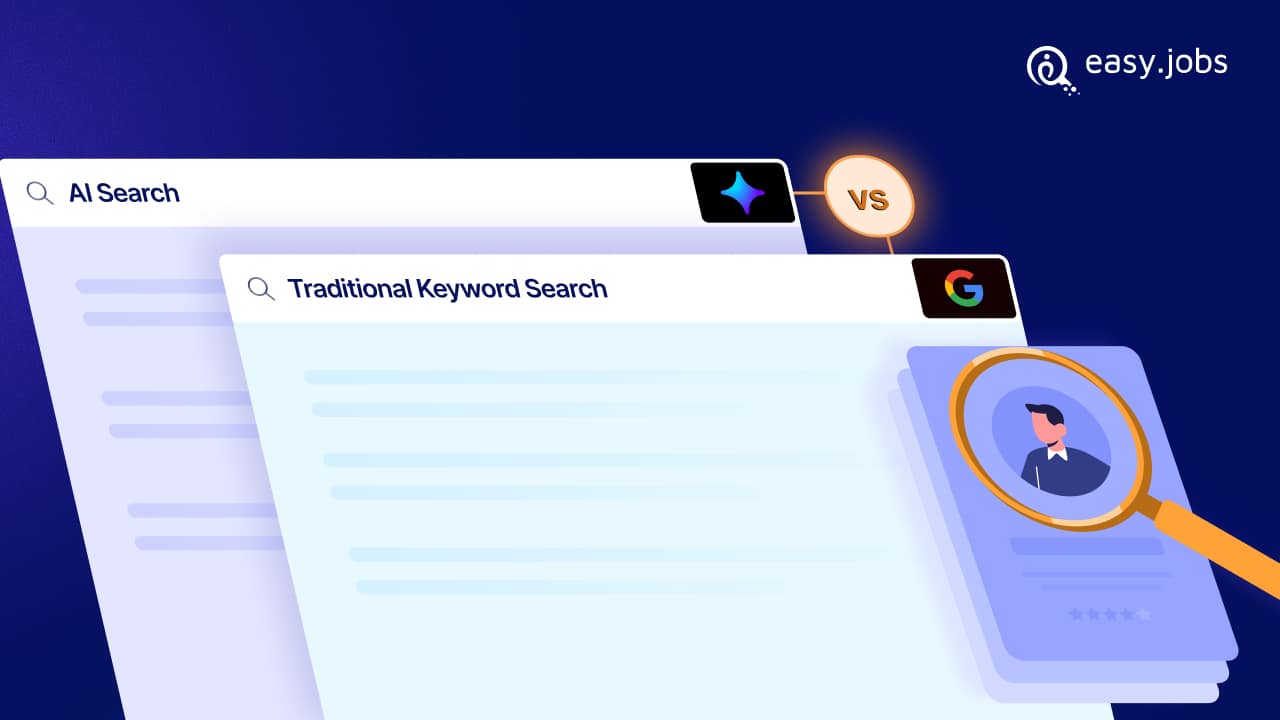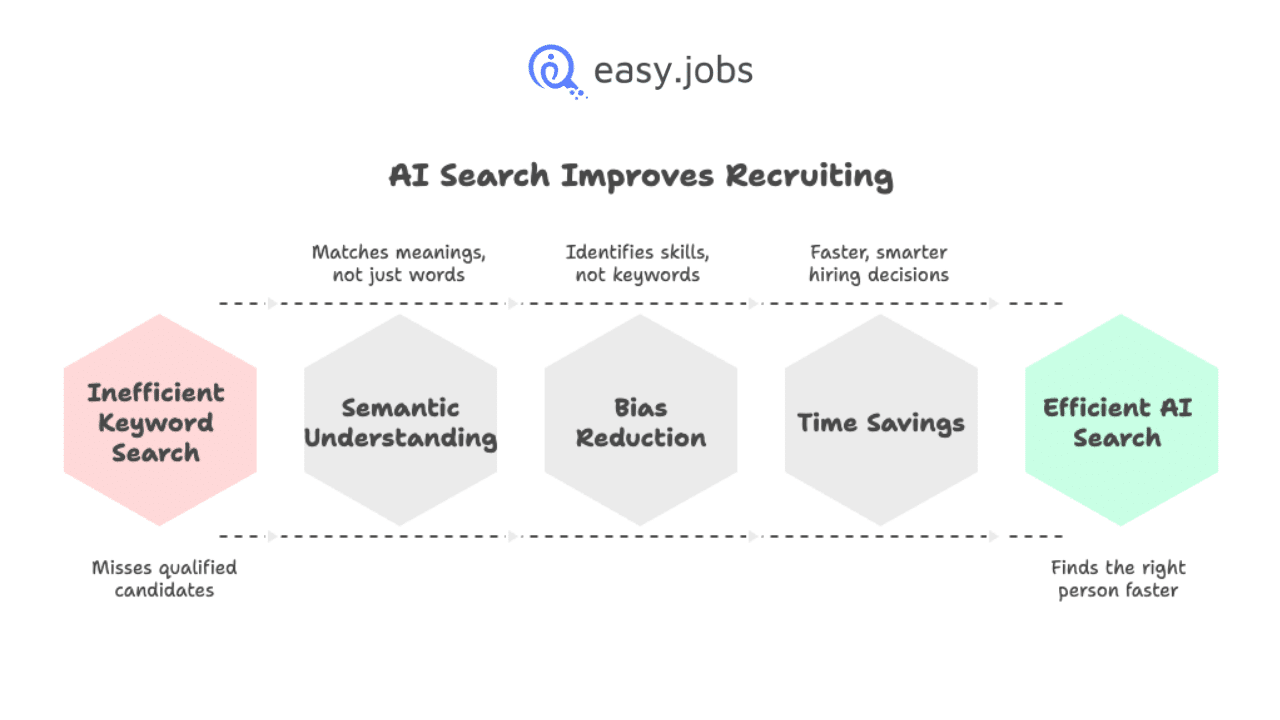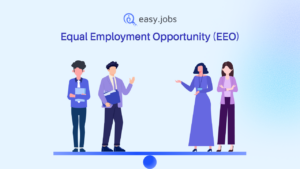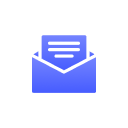Recruiters today face a big question: should they rely on traditional keyword search or move to AI-powered search when finding the right talent? The hiring world is changing rapidly and the way we search for candidates is evolving even more quickly.
Unlike keyword search, which depends on exact words, AI search understands meaning, context and intent – helping recruiters find candidates who truly fit the job, not just the description. This shift is transforming how companies implement the future of recruiting to discover talent, save time and make better hiring decisions.

In this blog, we will explore the AI-powered Search vs Traditional keyword search key differences and how recruiters can use both effectively to stay ahead.
What Is Traditional Keyword Search in Recruitment?

Traditional keyword search in recruitment is the method most recruiters have used for years. It works by matching the exact words you type, like job titles, skills, or locations, with words in a candidate’s resume or profile. For example, if you search for “graphic designer,” the system will only show profiles that include those exact words.
This method is simple and direct but has limits. If a candidate writes “visual designer” instead of “graphic designer,” you might miss them. Even if they have the same skills, keyword search does not understand meaning or context. It just looks for word matches. That is why many recruiters find it time-consuming and easy to miss great candidates who use different terms.
What Is AI-Powered Search for Recruitment?

AI-powered search is a smarter and more advanced way to find candidates or talent acquisition. Instead of only matching exact words, it understands what you mean. It uses artificial intelligence to look at the context behind your search. For example, if you type “graphic designer,” it can also find people who list “visual designer” or “brand designer,” because it knows those roles are related.
This type of search is called semantic search, which means it focuses on the meaning of words, not just the words themselves. For recruiters, that means less time writing long keyword strings and more time getting results that actually fit the job. AI-powered search helps you find stronger matches faster and makes hiring easier and more accurate.
Comparison: AI-Powered Search vs Traditional Keyword Search

Now that you know what both searches mean, let us see how they actually compare. Traditional keyword search works like a word finder. It looks for exact matches in resumes or profiles. If you do not use the same words as the candidate, search engines might not show them to you as result. Recruiters can use keyword stemming and write smarter for AI-driven search.
AI search, on the other hand, acts like a smart assistant. It understands what you are looking for, even if the words are different. It uses context, intent and related meanings to find more accurate results. For recruiters, this means fewer missed candidates and a better match between job requirements and real skills. Here is a simple comparison to help you understand better:
| Feature | Traditional Keyword Search | AI-Powered Search |
| How it works | Finds exact word matches | Understands meaning and context |
| Example | “Marketing Manager” only finds exact matches | Finds “Marketing Lead” or “Brand Manager” too |
| Search method | Boolean or keyword strings | Natural language or smart queries |
| Result accuracy | Can miss good matches | Finds broader and more relevant matches |
| Speed & efficiency | Takes time to fine-tune | Learns and improves over time |
| Best for | Simple, specific roles | Complex roles or skill-based hiring |
In short, traditional keyword search is useful but limited. AI search goes beyond words. It thinks like a recruiter, helping you discover talent that old systems might overlook.
Why Recruiters Should Care AI Search: Key Implications & Trends

Recruiting today is not just about finding someone for a job. It is about finding the right person, faster. And that is where the difference between AI search and keyword search really matters.
With traditional keyword search, recruiters often spend hours trying different combinations of words or Boolean strings to get the right results. It is like fishing with a small net. You might catch a few good candidates, but you will miss many others who used slightly different words to describe their skills. For example, someone skilled in “content strategy” might not show up if you only search “copywriting.”
AI search changes that. It acts more like a smart recruiter’s assistant. It understands that “copywriting,” “content writing,” and “brand messaging” are all connected. It does not just match words – it matches meanings. That means you get a fuller, more diverse pool of candidates who fit your hiring needs.
This also helps reduce bias. Instead of favoring only those who write resumes with specific “keywords,” AI search can identify real skill matches based on experience and intent. It saves recruiters time, improves the quality of hires and helps organizations find talent that truly fits their roles or finding recruitment trends an hr must know- not just their wording.
In short, as hiring becomes more competitive and fast-paced, AI search gives recruiters a huge advantage. It helps them make smarter, faster and fairer hiring decisions: something keyword search alone can not always do.
How to Transition from Keyword-Based to AI-Enhanced Sourcing

Switching from traditional keyword search to AI search may sound complicated, but it is actually a simple and natural upgrade. You do not have to give up everything you already know; you just need to adjust how you search and think about talent discovery. Here is how recruiters can make the shift step by step:
1. Understand Your Current Process
Start by reviewing how you currently search for candidates. What keywords or Boolean strings do you usually use? Where do you feel limited? Are you missing people who use different titles or skills? Knowing your gaps helps you see where AI can help.
2. Choose An AI-Powered Recruitment Tool
Many platforms today, like LinkedIn Recruiter, easy.jobs, and others, already have AI built in. Look for tools that offer semantic search, candidate matching, or AI recommendations. These use machine learning to understand relationships between skills, job titles, and experiences.
3. Try Natural Language Searches
Instead of typing exact strings like “(Marketing AND Manager) NOT Assistant,” you can now write simple sentences for example, “Find marketing professionals with leadership experience.” The AI will understand your intent and show results accordingly.
4. Combine Both Methods
You do not need to abandon keyword search completely. Use it for very specific roles or skills (like “Python developer” or “AutoCAD expert”) and use AI search when you need to find candidates with related or transferable skills. This balance gives you the best of both worlds.
5. Track Your Results And Refine
After using AI search, note how your results change. Are you finding better matches? Is your time to shortlist shorter? AI search gets smarter with use the more you interact with it, the better it learns what you are looking for.
By taking these small steps, recruiters can gradually move from exact-word searching to meaning-based matching. The result? A faster, smarter and more inclusive hiring process with a data-driven recruitment funnel where the focus is not just on keywords, but on potential and fit.
Common Pitfalls & How to Avoid Them

As recruiters start using AI-powered search, it is important to know that no system is perfect. AI can make hiring faster and smarter, but it still depends on how you use it. Many recruiters make simple mistakes that reduce the effectiveness of AI tools but with a few easy fixes, you can avoid them.
1. Relying Only on AI Results without Review
AI search can suggest great candidates, but it can also make mistakes. Sometimes, it might rank a candidate higher just because of certain patterns in the data. Always take time to review profiles yourself before shortlisting. Think of AI as a helper, not a decision-maker.
2. Ignoring the Quality of Your Job Descriptions
AI works best when it has clear, detailed information to analyze. If your job descriptions are too short or filled with buzzwords, AI can not understand what kind of candidate you really want. Write descriptions in simple, specific terms mentioning skills, tools and experience levels.
3. Forgetting About Keywords Completely
Even though AI understands meaning, it still uses keywords to guide its search. If your database or job listing does not include important terms (like “UI” and “User Interface”), AI might not connect them properly. Keep using relevant keywords in resumes and job ads, but use them naturally.
4. Not Updating the System Regularly
AI tools learn over time. If you do not update your data. Such as adding new job roles, modern skills, or current hiring trends. The system will rely on outdated information. Make it a habit to refresh your candidate pool and training data every few months.
5. Overlooking Human Judgment
AI can find patterns, but it can not sense motivation, creativity, or cultural fit. That is still a human skill. Always combine AI insights with your own understanding of people. The best recruiters use AI to narrow the search, then rely on their judgment to make final decisions.
In short, AI search is powerful, but it is most effective when guided by thoughtful recruiters. Use it as a tool to support your decisions, not replace them. The real magic happens when human intuition and AI intelligence work together.
Future Outlook: What Is Next in Search for Recruitment?

The way recruiters find candidates is changing faster than ever before and this change is just beginning. In the near future, AI search will become the standard, not the exception. Just like how online job portals replaced newspaper ads, AI is now reshaping how recruiters search, match and communicate with talent.
1. Smarter, Predictive Search
AI will soon be able to predict what kind of candidates you need even before you start searching. For example, if your company often hires “data analysts,” AI might suggest profiles with similar skill sets or show candidates ready for promotion. This saves time and helps recruiters stay ahead of hiring needs.
2. Better Candidate Matching
Future AI search tools resume just look at resumes. They will analyze skills, learning potential, online behavior and even soft skills using data from multiple platforms. This will make matching more accurate, helping recruiters find candidates who not only fit the job but also fit the team.
3. Conversational And Voice Search
Soon, recruiters may not even need to type searches. With voice-based or conversational AI tools, you could simply ask, “Find me a front-end developer with 3 years of React experience,” and the system will bring results instantly. This natural way of searching will make sourcing faster and more intuitive.
4. Fairer And More Inclusive Hiring
AI search can help reduce bias in recruitment. Instead of focusing on certain words or backgrounds, it looks at skills and potential. As these systems improve, recruiters will be able to reach a wider and more diverse range of candidates, leading to fairer hiring decisions.
5. Integration Across Platforms
AI search will also connect data from different sources: LinkedIn, job boards, company databases and even social platforms. This means recruiters need to switch between multiple tools. One intelligent search system will find all relevant candidates in one place.
In the future, recruiters who adapt to AI search early will have a big advantage. They will fill roles faster, discover stronger candidates and spend more time on what truly matters, building relationships and helping people grow in their careers.
AI resumes replace recruiters; it will empower them to work smarter, not harder. The key is learning to use these tools wisely, with a human touch guiding every decision.
Finding Balance Between AI And Human Touch
AI search has not replaced traditional keyword search; It has evolved it. Keyword search helps find specific tools or certifications, while AI search uncovers hidden talent and related skills. Smart recruiters use both: letting AI analyze data and suggest matches, while they focus on human insight, context and genuine connections.
Combining AI and keyword search makes hiring smarter, fairer, and faster. AI reveals insights beyond resumes, while keyword search ensures accuracy. The goal is not to replace recruiters but to empower them, reducing search time and strengthening connections. The future of recruitment lies in using both to hire intelligently and effectively. If you found this guide useful and want to learn more about AI-driven recruitment, subscribe to our blog for exclusive insights on smarter hiring strategies. For real-time tips and discussions, join our Facebook Community and connect with recruiters shaping the future of AI-powered hiring.






